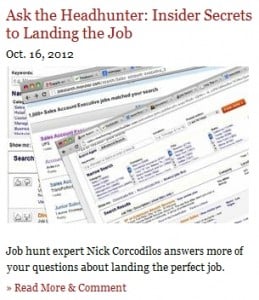The September 25, 2012 Ask The Headhunter Newsletter is a SPECIAL EDITION celebrating the 10th Anniversary of the newsletter! I’ve culled four of the top Q&As readers have cited among their favorites from past editions. I had fun summarizing them, and whether you’re a charter subscriber from 2002, or relatively new to Ask The Headhunter, I hope you learn something new and useful!
UPDATE: Coincidental with this edition, PBS NewsHour — Making Sen$e with Paul Solman — aired a segment yesterday that I taped with them at Wharton School of Management. The video is now posted here: PBS NewsHour: Online job applications keep America unemployed. The lead-up article I wrote for this is also on NewsHour online: Six Secrets to Beat the Job Market.
Want to be on PBS NewsHour? (You can use a screen name, of course!) As part of this PBS project, I’m taking questions from viewers! Submit questions on Paul Solman’s PBS NewsHour Q&A. I intend to answer every question submitted on the PBS website! Please post questions on the comments section of the blog. The more questions you post, the more Q&A ATH columns will appear on NewsHour! Keep ’em coming!
 (I started the newsletter on September 20, 2002 — 10 years ago! You’re reading issue #449! Many of you have been reading since issue #1, and today there are tens of thousands of subscribers — and not just job hunters.)
(I started the newsletter on September 20, 2002 — 10 years ago! You’re reading issue #449! Many of you have been reading since issue #1, and today there are tens of thousands of subscribers — and not just job hunters.)
Top Question 1: “Why are you leaving your old job?”
I began a job search this week. I’ve read so many suggestions about how to answer this question that I am not sure about it any more. I have an interview coming up. Can you please give me some advice about what to say when I’m asked the reasons I am leaving my current job?
Nick’s Reply
The real problem with this question is that you have no way of knowing the interviewer’s intent. And it’s not worth guessing and being wrong. If you believe that explaining your reasons for leaving your last job will reflect well on you, then by all means explain. If you’re worried the details could hurt you, then try this:
How to Say It
“I love my work, and I want to work in a better company where I am free to do my job effectively.”
If they ask you what the problem is with your current employer, be honest but turn the discussion to what really matters:
How to Say It
“I’m looking for a good job with a good company, but I never disparage anyone I’ve ever worked with. I came to you because your company is one of the shining lights in this industry, and I’d like to talk about how I can help you be more profitable. Can you give me an idea of what problems or challenges you’d want the person that you hire to tackle? I’d like to show you how I’d do that.”
That’s the best way I know to approach any employer, and to get past that question. Focus on the company you’re meeting with, not on your past or your old company. Explain how you’re going to help them be more successful. That’s what any good employer is really looking for. (Learn more in The Basics.)
Top Question 2: How can I get the truth about a job?
When I interviewed for my job, I was told that the person who hired me would be my boss. It turns out that I actually report day-to-day to someone else. If I had interviewed with this person, I would have kept looking for another job! I am working on a team that is abusive and for a boss who is unsupportive and disrespectful. I saw none of this in my interviews. You can’t fix that for me, but what I’d like to know is how to avoid this in the future. How can you really find out about the work environment and culture? A Google search (done too late) revealed some of the problems I discovered later. This company displayed a wonderful “we-are-so-caring-and-ethical” face, but the reality is quite different. Thanks!
Nick’s Reply
It’s called due diligence. Never take a job without investigating the company and its people. After you receive an offer, turn around and interview the company. Politely insist on meeting your future boss and the team, as well as others that you will interface with on the job. This includes people who will work directly with you; people who work uphill and downhill from your job function; and people in other departments who will influence your ability to succeed at your job.
For example, if you work in information technology, meet folks in manufacturing and accounting. Your work will affect both departments, and your fate will be influenced by how they operate. Your meetings will tell you about the viability of the company, and you will learn about the personalities of the players. Add up the personalities, and you will get the company culture. Company culture is hiding in cubicles and in meetings.
Ask to sit in on a department or team meeting before you accept the offer. Spend half a day shadowing a couple of your future co-workers. Make sure this includes lunch time, where people loosen up and talk. That’s the only way to really get at a company’s culture firsthand. Never take a job without knowing “the rest of the story.” Savvy companies set up these meetings for you. They recognize savvy candidates who are willing to invest time to get to know the people and the operation.
Top Question 3: Do I have to say it?
When I was job hunting, I always made it clear that I wanted the job. As a hiring manager, I want to ensure that positions are filled by qualified candidates who I know, undisputedly, want the job. Can you discuss the importance of this basic and obvious technique in interviewing that is often overlooked? That is, the applicant must always say to the potential employer, “I want this job.”
Nick’s Reply
A sales VP who interviewed for a job and failed to get an offer told me that making such an explicit statement is awkward and that it shows the candidate “has no class.” My response: Failure to say you want the job indicates you don’t have enough interest in working for the employer.
“The manager knows I want the job!” he exclaimed. “That’s why I’m interviewing!”
Interesting, isn’t it, how socially unacceptable some people believe it is to make an explicit commitment when that’s exactly what an employer needs to hear. When I first started headhunting, a manager turned down an excellent candidate I sent him — and I couldn’t figure it out. So I asked, and the manager was crystal clear: “He’s a talented guy, but I’m just not convinced he really wants to work for me.” This prompted me to coach every candidate to say it.
Consider this very appropriate analogy. You fall in love and want to marry the object of your desire. If you don’t explicitly say, “I love you,” do you think the person will marry you? The commitment must come first. You have to say it.
Top Question 4: How can I demonstrate my value?
I think you’re right: To get a company interested in me, I need to demonstrate and somehow quantify what my value is to them. But if I’m not a salesperson or entertainment star, how do I quantify my value to an employer’s bottom line?
Nick’s Reply
Here’s my general approach: Estimate as best you can how your work produces revenue or reduces costs. If you work in sales or product design, you help produce revenue in your job by selling or by creating products. That’s good for the company. The more you enhance the revenue-producing process, the more value you add to the business. If you work in finance or in manufacturing, you have a daily impact on the company’s costs. High costs are not good. Your job contributes to the success of the business by helping minimize costs.
The difference between revenue and cost is profit. No matter which part of the company you work in, you can help boost profits by doing your part to raise revenue or lower costs. Regardless of what your job is, ask yourself how you do it to enhance profits. Do you sell more stuff at higher margins, or do you do some other job smarter, faster, and cheaper? That’s your edge.
Estimate your impact to the bottom line. Can you shave two minutes off each customer service call you handle? Can you figure out a way to get a project done 20% faster? Multiply it out by the rate you get paid. That’s just one part of the profit you’ve contributed to the business. Get the idea? Yes, I’m simplifying, but any calculation like this that you do is more than any other candidate will even attempt. It gives you a good, honest story to tell the employer. It gives you an edge.
(Want to learn more about how to reveal your value? Check out my PDF book, How Can I Change Careers? It’s not just for career changers, but for anyone who wants to stand out in a job interview. Learn how to prove to an employer that you would be a profitable hire. Plus: Learn how to pick the handful of companies you should really pursue, and how to become the candidate on the inside track for the job you want.)
Have something to say about these top questions — and my advice? Have a question of your own to ask? Bring it on and we’ll tackle it! Please post away in the Comments section below!
: :
 During a bust, revenues and profits crash. Business tanks, and companies lay off workers because they can’t afford them. As the cycle turns and we start toward a boom (or think we are, anyway), sales take off, revenues spike, and profits surge.
During a bust, revenues and profits crash. Business tanks, and companies lay off workers because they can’t afford them. As the cycle turns and we start toward a boom (or think we are, anyway), sales take off, revenues spike, and profits surge.











